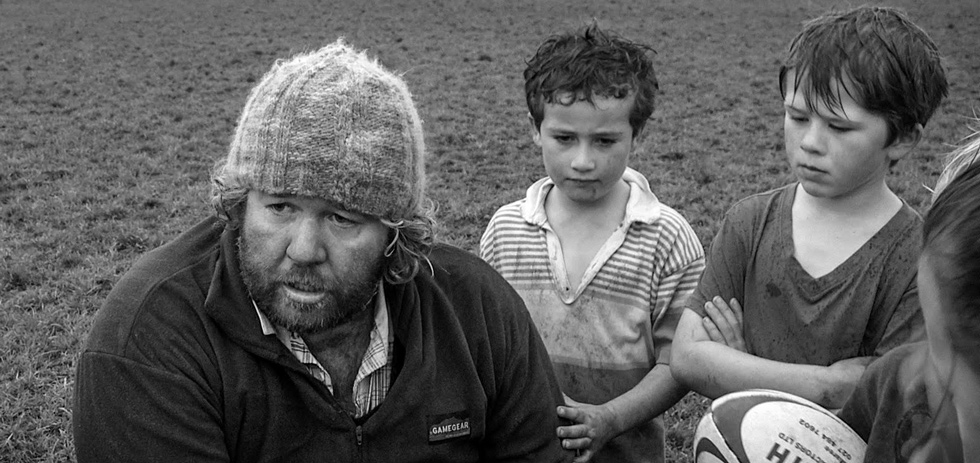
A true, honest-to-God cinema verité work is a rare thing to come by – the necessity of earning festival or commercial credentials can often translate to the expectation that documentaries evince a point of view distinct from, and yet bounded by, their stylistic form. The major achievement of Christopher Pryor’s The Ground We Won, a portrait of a rural New Zealand amateur rugby team, is its ability to explore ‘big’ ideas – about community, masculinity, and the contradictive team/individual split at the heart of team sport – without ever feeling like anything other than a reserved fly-on-the-wall observation. Moreover, its monochrome cinematography, a daring choice for such an ostensibly down-to-earth film, is completely successful in channelling the misty, old-world feel of its Bay of Plenty setting without once coming across as forced.1
The central conceit of The Ground We Won is a shaky coexistence: the regimented, formalised structure of regional rugby’s leagues and rules with the rough-and-ready rural manliness embodied by its players. On a broader level, it’s about the inadequacy of the prevailing cultural ideas about gender, community roles, and recreation when applied to the kind of guys who chuck a rugby ball around at the weekend on the rainy Kiwi North Island: located in a predominantly dairy-farming region, the community of Reporoa seems populated by salt-of-the-earth type agricultural families, where aspiration means hoping to one day be able to employ people to milk the cows for you. Whatever communal meaning their rugby games may hold won’t be verbalised by the players themselves, and so Pryor aims to reveal the ability of the sport to support the region socially through observation rather than investigation. The film’s power comes from its ability to paint the everyday struggles of its bawdy, ragtag farmers as near-operatic in nature, while retaining enough self-awareness to enjoy the comic, sweary rough-and-tumble of the crew of local blokes which forms the Reporoa union team.
One of the most fascinating techniques used in the film is the constant interjection of agricultural sequences as passage-of-time markers, in which Pryor highlights the rhythms of labour (milking, ploughing, birthing) both to showcase the hardscrabble lifestyle and raw natural beauty of the area, and to allow the seasons – environmental, not sporting – to delineate the film’s narrative progression. Curiously, there isn’t that much rugby in the film, and when there is, the black-and-white cinematography makes it all but impossible to discern one team from the other. We don’t follow the team as a sporting unit on a path to either loss or victory, but a social one functioning as part of wider web of responsibilities and rituals.
Individual personalities do come through, though, with four or five of the players followed closer than others – the comically overweight rugby tragic single dad, the teenaged farmhand focused on scoring with the local ladies at away days, the recent British arrival looking bewildered by the Kiwis’ aggressive drinking feats, and the lackadaisical captain swearing to retire and muck in at his parents’ farm. Pryor’s commitment to naturalism, though, means that we’re not conveyed any of this through neat voiceover/subtitle combos, but rather forced to nut it out from their demeanours and interactions with others. The effect is to both anonymise and universalise the players, who end up less TV-special decline-of-agriculture sadsacks and more effective metaphors for the struggles between the tedium of hard, thankless work and the rejuvenating but ultimately pointless joy of sport.
The Ground We Won is chock-full of inventive asides and subtle style choices. Women, for example, barely appear, perhaps an odd decision in a work so concerned with depicting its characters’ love of drinking, partying, and rooting. Rather than an oversight, though, the absence of any discernible ‘femininity’ (most obviously in the single father’s scenes with his twin sons, which are heartwarming but also somehow sad) serve as another barrier to success and happiness – without women to complement them, what use are the team’s lumpen manliness and on-field rage?
Other techniques are less successful: early interview-style pieces to camera deflate some of the sense of community on show by establishing rather clumsily who will function as ‘protagonists’; and the repeated away-game sequences of dressing-room pep-talk, game, post-match speeches, and then beers to oblivion begin to wear thin, if only because they vary so little.2 It’s the mark of an assured and effective documentary, though, that it can squeeze such a surfeit of ideas into a production ostensibly focused on simple chronicling of a time and place. It’s also a welcome change of pace for a ‘sport’ film to use the forms and rhythms of its central game as a means of exploring something wider: indeed, The Ground We Won makes relatively little of the apparently vital championship game played by the team. This is the right decision: Pryor is fully aware that for communities held together by work, sport, and mateship, it’s not winning or losing that counts, but pride and identity.
